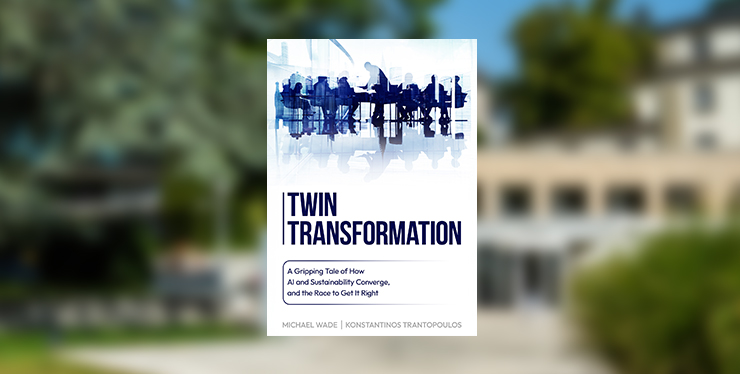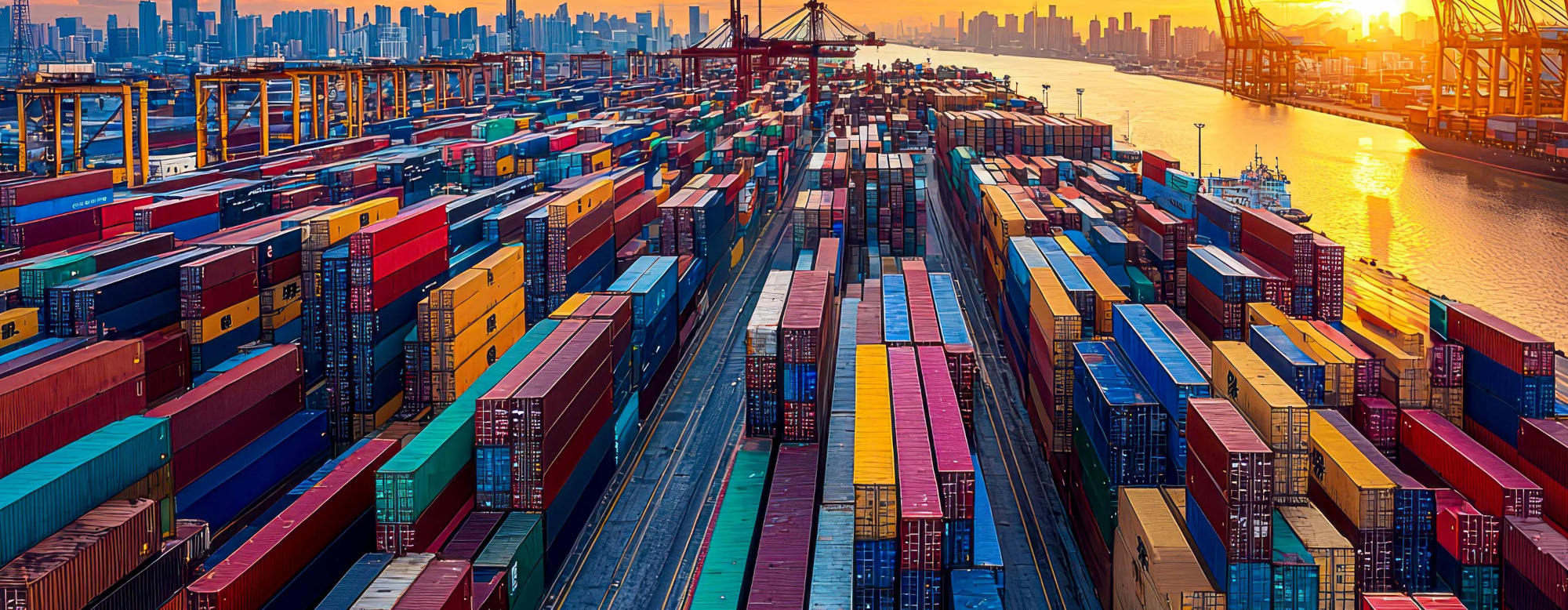
Why are companies setting up shop in the most expensive country in the world?
Without a doubt, Switzerland has been one of the most successful economies over the past several decades. It sits atop most international rankings in terms of productivity, innovation capacity, life satisfaction and competitiveness. Many of its companies are industry leaders and the country’s major value-enhancing innovations have ranged from Velcro to the Red Cross. Switzerland also possesses one of the most efficient financial systems in the world.
These achievements add to the attractiveness of the country for foreign multinationals (MNCs) which, in recent years, have been numerous in choosing this small country in the middle of Europe as a center of manufacturing, marketing and sales, and supply chain operations. In parallel, many other foreign MNCs’ headquarters have moved to Switzerland, to focus on international operations.
This has happened despite the inherent conditions in the country which make it not the most obvious choice to attract global companies. Geographical position is usually praised as one of the advantages of Switzerland; yet Switzerland does not have direct access to the sea, and we know that most of the current and future trade routes are maritime. Moreover, the United Nations estimates that about 40% of the world population currently lives by the sea. Not only that—Switzerland’s largest city (Zurich) hosts circa 400,000 people, in contrast to a world where close to 20% of the population live in urban areas of 10 million people or more. This number is expected to double in the next two decades.
Switzerland has also suffered from a decrease in productivity growth rates in the past few years. While output per capita grew in Switzerland by 1.5% per year on average between 1995 and 2005, it has grown only 0.69% in the last ten years. Relative to the US, where the same pattern can be found, Switzerland’s performance is even more disappointing. The graph below shows productivity in Switzerland and the US between 1950 and 2016. In 1950 both countries had similar levels of output; but by 2016 Switzerland’s productivity was only 80% of that of the United States.
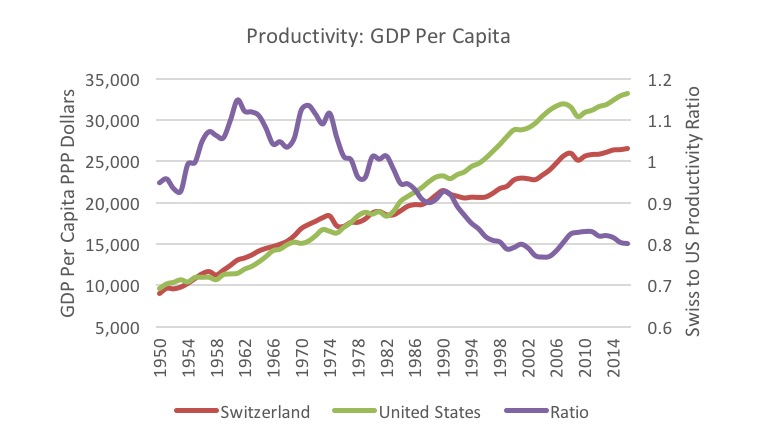 Unlike the US, however, labor costs and especially real wages have not declined in the last 25 years in Switzerland. The IMD World Competitiveness Report shows that, while nominal labor costs have increased 17% on a cumulative basis since 2007, the increase in Switzerland was 39%. Given inflation levels, in real terms the difference is even more striking.
Unlike the US, however, labor costs and especially real wages have not declined in the last 25 years in Switzerland. The IMD World Competitiveness Report shows that, while nominal labor costs have increased 17% on a cumulative basis since 2007, the increase in Switzerland was 39%. Given inflation levels, in real terms the difference is even more striking.
In that regard, Switzerland is also the most expensive country in the world. It ranks second to last in the IMD World Competitiveness Rankings in terms of cost of living (only better than Hong Kong). Its currency has appreciated massively throughout 2015-16, and the Big Mac index released by The Economist puts prices in Switzerland already 20% more expensive than the second most expensive country (Norway). As a result, remuneration of employees, executives and professionals is the highest in the world, which makes relocation very costly for foreign MNCs.
Why then do MNCs such as Philip Morris and ABB choose Switzerland as a base for their operations? Why, after the merger between Lafarge from France and Holcim from Switzerland, was it chosen as home of the new entity?
Foreign MNCs consider that taxes are the prime reason why Switzerland is attractive. Switzerland compares to Singapore and Hong Kong in terms of corporate taxes on profits, despite being a manufacturing—not a services economy. Compared to Germany, Japan, and the United States, corporate taxes in Switzerland are certainly the source of a significant competitive advantage.
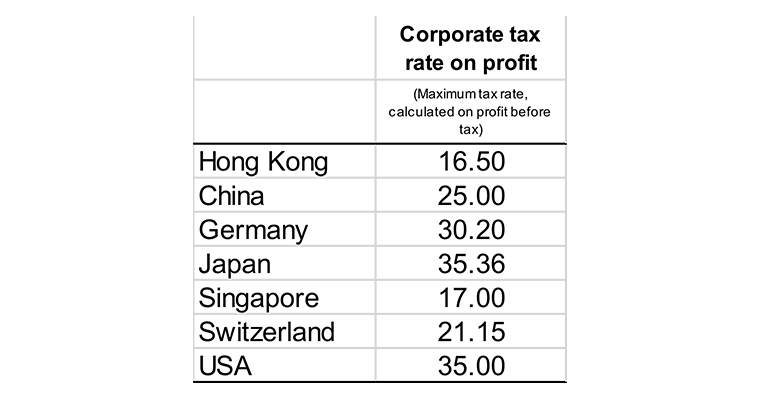 The second factor to consider is availability of talent. The IMD World Talent Report has emphasized that, in order for countries to excel in talent quality, they need: (1) a good education system; (2) the ability to attract and retain foreign talent and avoid brain drain; and (3) companies that promote and develop talent within the organization, by matching talent and activities with the utmost efficiency. Our 2015 ranking positioned Switzerland in the top position of the talent ranking, and it is ranked number one in attractiveness and development factors.
The second factor to consider is availability of talent. The IMD World Talent Report has emphasized that, in order for countries to excel in talent quality, they need: (1) a good education system; (2) the ability to attract and retain foreign talent and avoid brain drain; and (3) companies that promote and develop talent within the organization, by matching talent and activities with the utmost efficiency. Our 2015 ranking positioned Switzerland in the top position of the talent ranking, and it is ranked number one in attractiveness and development factors.
Talent management and innovation constitute the pillars of business competitiveness, our analyses have shown. Switzerland is indeed the most innovative country in the world, on par with the US. Innovative capacity, the set of processes and practices that companies put in place to facilitate entrepreneurship and failure, cannot be only measured by the number of patents released. When asked whether the “innovative capacity of firms (to generate new products, processes and/or services) is high” in Switzerland, survey respondents rank the country 8.29 on a scale from 1 to 10.
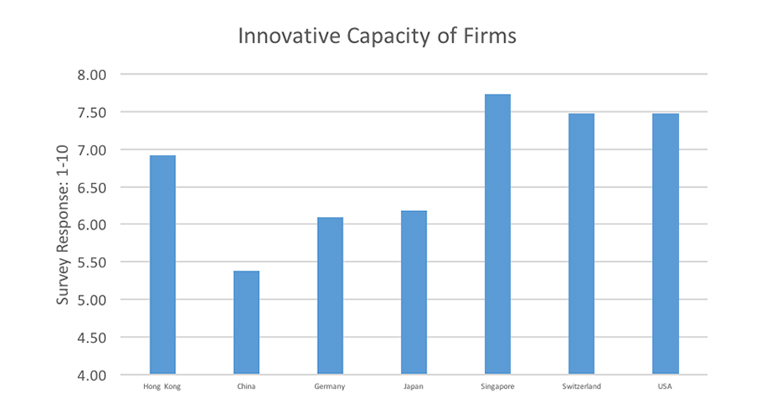 With regard to political issues, Switzerland is a European democracy with a sound and reliable legal system. For corporations this is not enough, yet Switzerland offers policy stability within a system where rule of law is upheld to a degree not matched elsewhere in the world. While Hong Kong and Singapore compete for such a status, neither are democratic countries. And while other countries such as the UK or the US have governance systems—both in the public and private sectors—where rule of law is paramount, these are countries where policy is unpredictable; just look at the latest election results! The IMD World Competitiveness Center research has shown that policy stability is key for competitiveness. Policy stability is not political stability: in Switzerland there is a social consensus which guarantees that future regulatory decisions will satisfy certain basic principles, such as free enterprise, profit maximization and corporate friendliness.
With regard to political issues, Switzerland is a European democracy with a sound and reliable legal system. For corporations this is not enough, yet Switzerland offers policy stability within a system where rule of law is upheld to a degree not matched elsewhere in the world. While Hong Kong and Singapore compete for such a status, neither are democratic countries. And while other countries such as the UK or the US have governance systems—both in the public and private sectors—where rule of law is paramount, these are countries where policy is unpredictable; just look at the latest election results! The IMD World Competitiveness Center research has shown that policy stability is key for competitiveness. Policy stability is not political stability: in Switzerland there is a social consensus which guarantees that future regulatory decisions will satisfy certain basic principles, such as free enterprise, profit maximization and corporate friendliness.
A manufacturing country cannot survive, however, without access to financing. This is especially important for small and medium enterprises. The economic development of Switzerland has happened as the financial sector has grown. Today executives consider that Switzerland offers the easiest access to financing in the world. When asked about availability of credit in the country, respondents to the IMD World Competitiveness survey rank Switzerland first, with Sweden, Hong Kong and Denmark right below.
Additionally, regulation is business friendly and policy is regularly oriented to favor entrepreneurship and the creation of firms. Within a Europe that is slowly moving toward a more flexible labor market, Swiss labor regulations provide a different landscape for employment protection and labor costs, resulting in low unemployment, but also very low costs of hiring a very qualified labor force.
Lastly, connectivity is key for a country’s success in a world where borders are losing relevance for the movement of people and products. Switzerland has recently being ranked #4 in the world (only surpassed by the US, Singapore and Sweden) by the Global Connectivity Index produced by Huawei. Investments in soft and hard infrastructure have created a very efficient distribution network, key for foreign MNCs that see Switzerland as their base for procurement and logistics.
Overall, the benefits of a Swiss location definitely outweigh their costs.
Arturo Bris is Professor of Finance at IMD and directs the IMD World Competitiveness Center. He will be giving a keynote speech at IMD’s Orchestrating Winning Performance (OWP) which takes place in Singapore from November 28 to December 2nd, 2016.
Research Information & Knowledge Hub for additional information on IMD publications
To understand America’s aggressive shift on trade, you must first grasp the silent, slow building, decades-long erosion of American middle-class prosperity. This shift began well before President Trump and will outlive him. It is rooted in the col...
After more than a decade of war and isolation, Syria is edging back into the global economy. The signs are familiar: commercial flights have resumed, sanctions are being eased and its debts are being cleared. Gulf investors are circling. Infrastru...
The Great Trade Hack by Richard Baldwin explains how Trump’s 2025 tariff blitz wasn’t economic strategy. It was grievance politics. Tariffs, Baldwin shows, are political placebos that won’t fix the U.S. economy but could fracture the global trade ...
On 12 May 2025, China and the United States released a joint statement that ended the recent escalation in tariffs. For 90 days each agreed to lower their tariffs by 115%. This only applies to import taxes imposed since 2 April 2025—all prior tari...
This paper presents a compact and intuitive framework that consolidates, simplifies, and extends results on the links between technology, trade, and labour market outcomes. It makes three main contributions. First, it presents closed-form solution...
Research Information & Knowledge Hub for additional information on IMD publications
in Gensler, Gary (Ed.); Johnson, Simon (Ed.); Panizza Ugo (Ed.); Weder di Mauro, Beatrice (Ed.) / The Economic Consequences of The Second Trump Administration: A Preliminary Assessment, pp. 239-244 / PAris: CEPR Press, 2025
Research Information & Knowledge Hub for additional information on IMD publications
Published by International Institute for Management Development ©2025
Research Information & Knowledge Hub for additional information on IMD publications
in I by IMD
Research Information & Knowledge Hub for additional information on IMD publications
Research Information & Knowledge Hub for additional information on IMD publications
Research Information & Knowledge Hub for additional information on IMD publications
Research Information & Knowledge Hub for additional information on IMD publications
Research Information & Knowledge Hub for additional information on IMD publications
in Journal of International Economics May 2025, vol. 155, 104065, https://doi.org/10.1016/j.jinteco.2025.104065
Research Information & Knowledge Hub for additional information on IMD publications
in I by IMD
Research Information & Knowledge Hub for additional information on IMD publications





